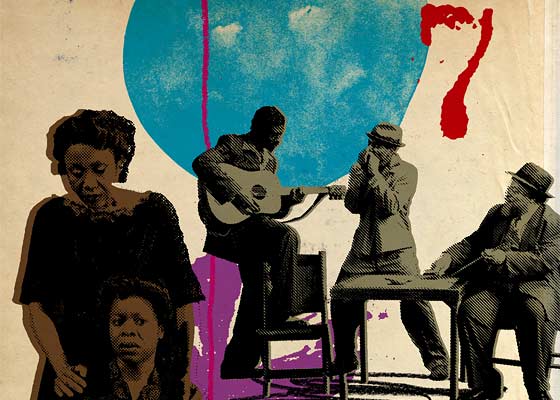
Like all bluesmen, August Wilson made sophisticated art from simple materials. None of the verbal pirouettes of Tennessee Williams or the florid speeches of Clifford Odets here: In his ten-play cycle about the African-American experience, Wilson created melodies from the plainest speech. Listen:
“I am going to Chicago. If I have to buy me a graveyard and kill everybody I see. I am going to Chicago. I don’t want to live my life without. Everybody I know live without. I don’t want to do that. I want to live with. I don’t know what you all think of yourself, but I think I’m supposed to have. Whatever it is. Have something. Have anything.”
That frustrated cry is from Seven Guitars—not Wilson’s most enduring play, but, as a sometimes gratifying new revival at Signature Theatre suggests, maybe his most musical. In 1948 Pittsburgh, seven men and women struggle to find some measure of love, security, and dignity. They meet in a common backyard to share grievances and aspirations, trying to cope with brutal everyday life—as Ralph Ellison wrote in a description of the blues—“by squeezing from it a near-tragic, near-comic lyricism.”
That lyricism abounds in Wilson, but it isn’t easy to put onstage. He shares a certain slipperiness with, oddly enough, David Mamet: Their language sounds either effortless or like self-parody. An accomplished Wilsonian actor in his own right, director Ruben Santiago-Hudson draws fine, unforced acting from most of his cast. But when a play runs nearly three hours and demands virtuosity of everyone onstage, a really satisfying revival needs something close to perfection—closer than this, anyway.
To the extent that it has any narrative interest, the play’s a whodunit. It opens with the funeral of Floyd “Schoolboy” Barton (Lance Reddick), a musician killed under mysterious circumstances. (The air of mortality makes this a sorrowful night—Wilson died, much too young, last year.) The rest of the play is a flashback, full of dialogue that now and then unfolds into a long speech—choruses and solos, if you like. Thus Floyd’s bandmate Canewell (Kevin Carroll) woos beautiful young Ruby (Cassandra Freeman), but also delivers a sermon on how Lazarus tired of “the pain of living.” The jovial Red Carter (Stephen McKinley Henderson) will joust with Canewell about whether guns are better than knives, then tell a delightful tale about the difficulty of having a different woman for each night of the week. (Henderson is a model Wilsonian: He can hit the extremes of comedy and menace, high style and naturalness, with the lightest touch.)
The play wouldn’t be blues if it didn’t find room, amid all the death and violence, for heartache and trouble. The wondrous Roslyn Ruff plays Floyd’s neglected girlfriend, Vera, with a wary sadness, letting us see the part of her that wants to let herself go, and the part that knows better. Her no-nonsense neighbor Louise (sharp Brenda Pressley) proves she’s more than a match for any of the gentlemen in sight, as when somebody says a woman needs a man. “I don’t need none that bad,” she says. “I got me a .32-caliber pistol up there. That be all the man I need.”
This lyricism is usually so captivating you don’t mind that nothing much happens. But much of Act Two belongs to Hedley, whose long tirades about Ethiopia rising up and dreams of Buddy Bolden and the perfidious white man can upset a production if a director isn’t careful. Sure enough, Charles Weldon’s overwrought treatment snaps you out of the story. Suddenly, you notice that you’ve been sitting still for an awfully long time.
This is only the beginning of a Wilson-heavy season: Two more plays at Signature and, if we’re lucky, the revival of Fences with Laurence Fishburne that just opened in Pasadena are still to come. They’ll offer fresh chances to take the measure of Wilson as a social critic and storyteller, not just the understated stylist Seven Guitars shows him to be. That aspect of his work will always be welcome. As Ellison wrote, “The world’s getting bluesier all the time.”
Seven Guitars
August Wilson. Signature Theatre. Through October 7.